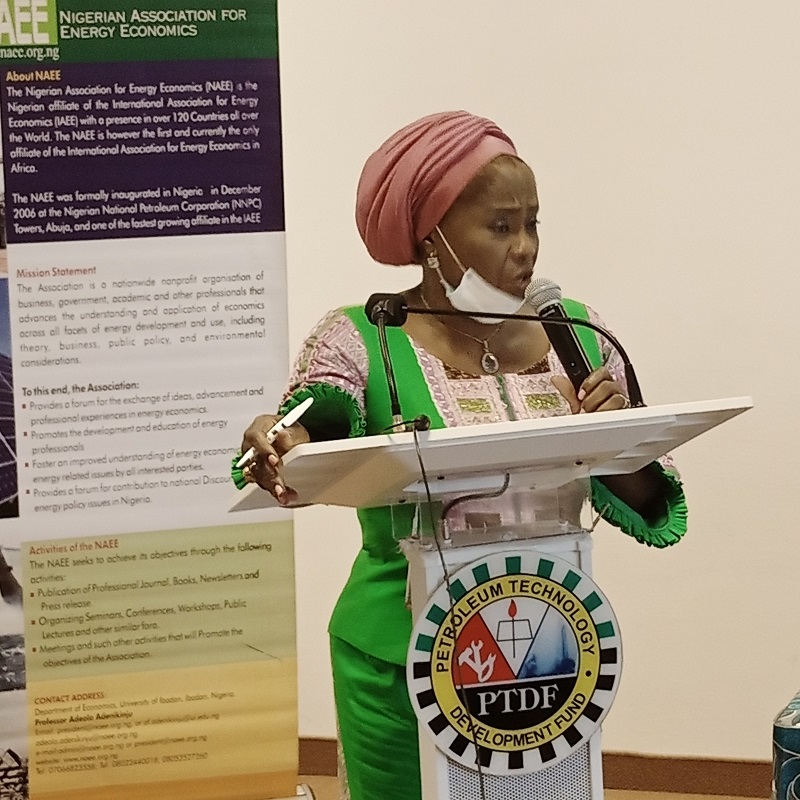Professor Yinka Omorogbe, President of the Nigeria Association for Energy Economics
…Energy industry severely impacted with global oil demand drastically reduced by 2.5 million per day.
…Countries planning to shift attention to natural gas.
…The use of electronic cars and renewables are growing rapidly.
-By Felix Douglas
The Nigerian Association for Energy Economics (NAEE), an affiliate of the International Association for Energy Economics (IAEE), had its 13th Annual Conference recently with the theme: ENERGY AND PETROLEUM IN A POST-COVID WORLD, in Abuja. NAEE is an energy economics association with members across the energy value chain most of whom are within the academic institutions, professional bodies and operators in the energy sector. It is a structured body accustomed to long-term planning and projections for the sector.
Addressing members, guests and participants at the Annual Conference, President of NAEE, Professor Yinka Omorogbe, was of the view that the Coronavirus also known as Covid-19 pandemic became the most important issue, and has, without doubt been the dominating feature for 2020.
Professor Omorogbe disclosed that the pandemic has changed lifestyles, and disrupted activities across the globe. It taught people to relearn and adapt to circumstances, devoid of so much that they had previously taken for granted. Life is no more a comfort zone where people could move freely hence, they are confronted with new normal.
“Even though sustainable development and climate change remain critically important, we therefore decide to critically consider the impact of the pandemic on the energy industry. The energy industry has been severely impacted. To put it in perspective, global oil demand has drastically reduced by 2.5 million barrels a day and will continue to be threatened by reduced economic activity in the wake of the second wave of the pandemic which is currently underway, she added.”
The NAEE President said, Nigeria stands at a critical moment, as a petroleum dependent “country which has remained bedevilled by the ‘Resource Curse’ unable to even make any lasting changes to a legal and institutional structure that all agree is detrimental to the sustainable development of its citizens, it is, frankly speaking, in dire straits, even without the present pandemic.”
However, “without proper strategic planning, it could end up being one of the most negatively impacted nations of the world, unable to effectively navigate the post Covid world.”
She asked if the country is engaged in any strategic planning in this area?
The NAEE President said, the association realises that the country has to confront the effects of the present and continuous disruption and plan for what may be the new normal. “We therefore feel that the time to critically interrogate the ways and means by which the coronavirus has affected our sustainable and economic development, and the petroleum industry that we still continue to depend on, is now. Therefore, we need to critically understand and unravel Energy and Petroleum in a Post Covid World, and in doing that, see how best to weather the inevitable storms, and come out modified, strengthened and prepared to not only cope, but to triumph as a nation.”
Professor Omorogbe was worried about the Nigerian petroleum industry that has exhibited incapacity to change and adapt, as evidenced by about twenty years of a petroleum reform bill which has not been enacted by the country’s government. The Petroleum Industry Bill (PIB) is a significant legislation to guide and govern the energy sector but the bill has been foot-dragging in the National Assembly. It has become an embarrassment to the country and industry.
On the present state of the oil industry, Professor Omorogbe stated, “this is tragic because even before the coronavirus pandemic, Nigeria had ceased to be a beautiful bride. Several new producers were springing up in Africa and all over the world, and the green movement was a reality, even in countries such as Dubai and Saudi Arabia. In Dubai, 7% of total power output is from renewable energy, and it has a set target of 25% by 2030, and 75% by 2050. Similarly, Saudi Arabia plans to produce 70% of its power from natural gas, and 30% from renewable energy by 2050.”
Professor Omorogbe advised the country on its energy planning. The energy planning decisions should be communicated and made operational to government institutions. The country needs institutional synergy necessary for effective energy planning.
The NAEE President enjoined industry stakeholders to promote diversification aggressively and put aside sectional and group interests in favour of national concern. There is need to promote and drive the emergence of a reformed and virile petroleum industry before competition renders production unattractive due to recent trend and development in the industry. Crude oil is no longer the primary source for motor fuel hence an opportunity to grow the domestic gas market.
Nigeria has more than 100 plus population who are energy deprived, it needs a discernable policy on renewables with mechanism in place to promote inevitability of renewables.
Thus, internal issues that impact on demand, environmental sustainability, security and sustainable development should be put into proper perspective. There has to be thriving alternate petroleum industries of the Niger Delta communities, through which crude oil and products are regularly sold.
She opined that, it is time for the country to realise the inevitability to restructure the nation’s legal and administrative mechanisms so as to recognise and incorporate them into the mainstream.


Comment here